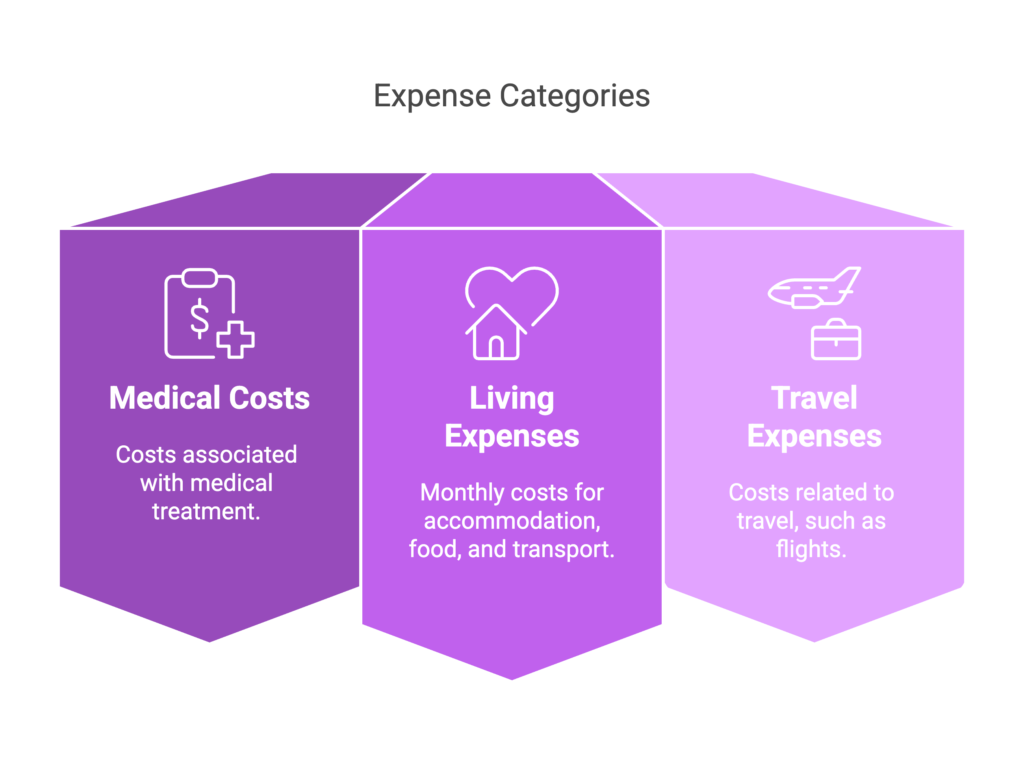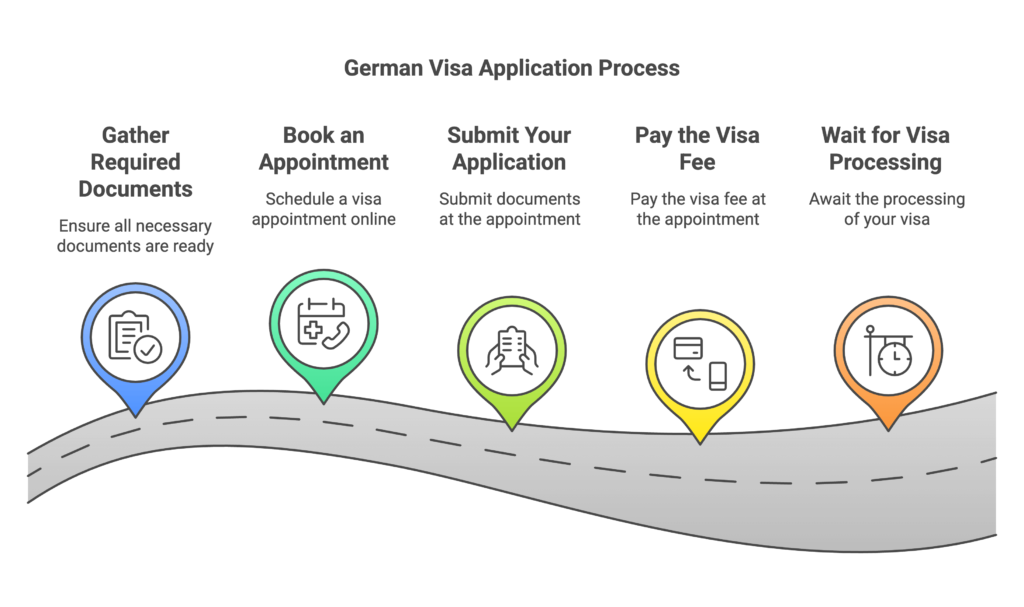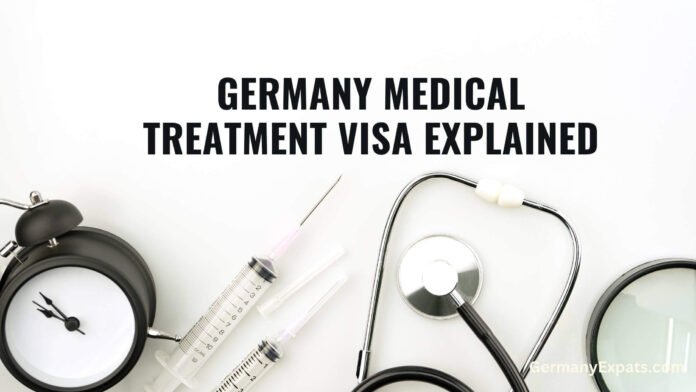A Visum für medizinische Behandlung ist ein kurzfristiges Visum, das Ausländern gewährt wird, die aus medizinischen Gründen nach Deutschland reisen müssen. Deutschland ist bekannt für seine erstklassige Gesundheitspflege System und fortschrittliche medizinische Behandlungen. Menschen aus aller Welt reisen nach Deutschland, um medizinische Versorgung zu suchen, die in ihrem Heimatland möglicherweise nicht verfügbar ist. Ausländer benötigen ein Visum für medizinische Behandlung, um in Deutschland Gesundheitsdienste in Anspruch nehmen zu können. Dieser Leitfaden enthält alle wichtigen Informationen zu diesem Visum, einschließlich Berechtigung, Antragsverfahren und erforderlichen Dokumenten.
Überblick über die Visum für medizinische Behandlungen in Deutschland
Deutschland ist ein Top-Ziel für medizinische Behandlungen und bietet erstklassige Gesundheitsversorgung, fortschrittliche Medizintechnik und spezialisierte Ärzte. Das deutsche Visum für medizinische Behandlungen ermöglicht Nicht-EU-Bürgern die Einreise des Landes für die medizinische Versorgung, ob für komplexe Operationen, Spezialtherapien oder Langzeitbehandlungen.
Wer benötigt ein medizinisches Behandlungsvisum für Deutschland?
Nicht-EU-Bürger, die sich in Deutschland medizinisch behandeln lassen möchten, müssen ein Visum zur medizinischen Behandlung beantragen. Dieses Visum ist für Patienten erforderlich, die sich geplanten Eingriffen, Operationen oder Rehabilitationsmaßnahmen unterziehen. Manchmal benötigen auch Familienangehörige oder Betreuer, die den Patienten begleiten, ein Visum.
Vorteile einer medizinischen Behandlung in Deutschland
Deutschland ist für seine hochmoderne medizinische Forschung, seine hochqualifizierten Ärzte und seine hochmodernen Einrichtungen bekannt. Patienten profitieren von kürzeren Wartezeiten, hohen Erfolgsraten bei komplexen Behandlungen und Zugang zu spezialisierter Versorgung, die in vielen Ländern nicht verfügbar ist. Die strengen Gesundheitsvorschriften des Landes sorgen außerdem für hohe Sicherheits- und Qualitätsstandards.
Informationen zum deutschen Visum für medizinische Behandlungen
Definition und Zweck
Das deutsche Visum für medizinische Behandlung ist eine hervorragende Möglichkeit für Nicht-EU-Bürger, die in Deutschland medizinische Versorgung suchen. Es ermöglicht Patienten, in das Land zu reisen, um sich speziellen Behandlungen, Operationen oder Langzeittherapien zu unterziehen, die in ihrem Heimatland möglicherweise nicht verfügbar sind. Darüber hinaus unterstützt dieses Visum diejenigen, die den Patienten begleiten möchten, wie Pflegekräfte oder Familienmitglieder, und stellt sicher, dass sie diese Reise mitmachen können.
Unterschied zwischen einem medizinischen Visum und anderen deutschen Visatypen
Im Gegensatz zu einem normalen Touristen- oder Geschäftsvisum dient das Visum für medizinische Behandlungen Gesundheitszwecken. Zu den wichtigsten Unterschieden gehören:
- Touristenvisum: Dies ermöglicht kurzfristige Reisen zu Freizeitzwecken, die medizinische Behandlung ist jedoch nicht ihr Hauptzweck.
- Schengen-Visum: Dieses Visum gilt für Kurzaufenthalte in Deutschland und anderen Schengen-Ländern, ist aber möglicherweise nicht für eine Langzeitbehandlung geeignet.
- Nationales Visum (D-Visum): Das medizinische Visum fällt unter diese Kategorie, wenn die Behandlung einen längeren Aufenthalt über 90 Tage hinaus erfordert.
Das Visum zur medizinischen Behandlung wird auf Grundlage der Dauer der Behandlung erteilt:
- Kurzfristiges medizinisches Visum (Schengen-Visum Typ C):
- Gültig bis zu 90 Tage innerhalb 180 Tage.
- Geeignet für kleinere Eingriffe, Konsultationen oder kurzfristige Therapien.
- Normalerweise wird es je nach medizinischem Bedarf für eine oder mehrere Einreisen ausgestellt.
- Langfristiges medizinisches Visum (Nationales Visum Typ D):
- Erforderlich für Behandlungen mit langer mehr als 90 Tage.
- Ermöglicht mehrere Einreisen und kann bei medizinischer Notwendigkeit verlängert werden.
- Bei längerfristiger Behandlungsbedürftigkeit kann sie in eine Aufenthaltserlaubnis umgewandelt werden.
Wer hat Anspruch auf ein deutsches Visum zur medizinischen Behandlung?
Das deutsche Visum zur medizinischen Behandlung ist für Personen erhältlich, die in Deutschland medizinische Versorgung benötigen. Die Berechtigung hängt vom Zustand des Patienten, der Notwendigkeit der Behandlung und der unterstützenden Dokumentation einer anerkannten medizinischen Einrichtung ab.

Patienten, die eine spezialisierte Behandlung suchen
Dieses Visum ist in erster Linie für Nicht-EU-Bürger gedacht, die in Deutschland eine spezialisierte medizinische Versorgung benötigen. Patienten, bei denen schwere Krankheiten, seltene Erkrankungen oder Leiden diagnostiziert wurden, die eine fortgeschrittene Behandlung erfordern, die in ihrem Heimatland nicht verfügbar ist, können sich bewerben. Um sich zu qualifizieren, müssen sie einen bestätigten Arzttermin in einem Krankenhaus oder einer Klinik in Deutschland haben. Viele Patienten reisen für komplexe Operationen, fortgeschrittene Therapien oder innovative Behandlungen, die anderswo nicht verfügbar sind.
Personen, die eine medizinische Anschlussversorgung wünschen
Patienten, die bereits in Deutschland behandelt wurden, müssen möglicherweise für Folgekonsultationen, Rehabilitationstherapie oder postoperative Kontrolluntersuchungen zurückkehren. Mit diesem Visum können die Betroffenen ihre medizinische Behandlung unter der Aufsicht derselben Spezialisten fortsetzen. Auch Patienten mit chronischen Krankheiten, die eine fortlaufende Untersuchung und Langzeitbehandlung benötigen, fallen in diese Kategorie.
Betreuer und begleitende Familienangehörige
Auch Familienmitglieder oder Betreuer, die einen Patienten begleiten, können ein Visum beantragen. Dazu gehören Ehepartner, Eltern oder Kinder, die während der Behandlung emotionale oder körperliche Unterstützung leisten. Wenn der Patient minderjährig ist oder nicht alleine reisen kann, kann die Begleitung durch einen gesetzlichen Vormund oder persönlichen Betreuer erforderlich sein. Das Visum für Begleitpersonen ist in der Regel an das medizinische Visum des Patienten gekoppelt und hat dieselbe Gültigkeitsdauer.
Arten deutscher Visa für medizinische Behandlungen
Deutschland bietet zwei Arten von medizinischen Behandlungsvisa an, je nach Dauer und Art der erforderlichen medizinischen Versorgung. Patienten müssen je nach Behandlungsplan und voraussichtlichem Aufenthalt im Land das richtige Visum wählen.
Kurzfristiges (Schengen) medizinisches Visum (Typ C)
Das Schengen-Visum für medizinische Zwecke ist für Patienten gedacht, die innerhalb von 180 Tagen bis zu 90 Tage lang medizinische Versorgung in Deutschland benötigen. Es ermöglicht Personen, kurzfristige Behandlungen, Konsultationen oder kleinere medizinische Eingriffe in Anspruch zu nehmen. Dieses Visum ist für Personen geeignet, die vorübergehend medizinische Versorgung benötigen, ohne einen längeren Aufenthalt zu haben.
Für ein medizinisches Schengen-Visum infrage kommende medizinische Behandlungen
Patienten, die sich medizinischen Untersuchungen, kleineren Operationen oder einer kurzfristigen Rehabilitation unterziehen, können dieses Visum beantragen. Es eignet sich auch für Nachuntersuchungen oder Zweitmeinungen deutscher Fachärzte. Ein nationales Visum ist jedoch erforderlich, wenn die Behandlung einen längeren Krankenhausaufenthalt oder eine umfangreiche Therapie über 90 Tage hinaus erfordert.
Langfristiges (nationales) medizinisches Visum (Typ D)
Das nationale medizinische Visum ist für Patienten gedacht, die länger als 90 Tage in Deutschland medizinisch behandelt werden müssen. Es ermöglicht mehrere Einreisen und kann bei medizinischer Notwendigkeit verlängert werden. Dieses Visum ist ideal für Patienten, die sich einer Langzeittherapie, größeren Operationen oder Rehabilitationsprogrammen unterziehen, die längere Aufenthalte erfordern.
Wann ist ein nationales medizinisches Visum erforderlich?
Patienten, die komplexe medizinische Eingriffe, fortlaufende Krebsbehandlungen, Organtransplantationen oder spezielle Therapien über mehrere Monate benötigen, müssen dieses Visum beantragen. Es ist auch für diejenigen erforderlich, die nach einer Operation oder einem längeren Krankenhausaufenthalt eine Rehabilitation benötigen. Manchmal kann das Visum in eine Aufenthaltserlaubnis umgewandelt werden, wenn eine längere medizinische Versorgung erforderlich ist.
Anforderungen für ein Visum zur medizinischen Behandlung in Deutschland
Um ein deutsches Visum zur medizinischen Behandlung zu beantragen, müssen Antragsteller bestimmte Dokumente vorlegen, die die Notwendigkeit ihrer medizinischen Versorgung und ihre Fähigkeit, sich während ihres Aufenthalts selbst zu versorgen, belegen. Die Erfüllung dieser Anforderungen ist für einen erfolgreichen Visumsantrag unerlässlich.
Allgemeine Dokumentations-Checkliste
Antragsteller müssen ein ausgefülltes Visumantragsformular, einen gültigen Reisepass mit mindestens zwei leeren Seiten und aktuelle biometrische Passfotos einreichen. Sie müssen außerdem ein Anschreiben mit einer Erklärung über den Zweck und die Dauer des medizinischen Aufenthalts sowie einen Nachweis über die Unterbringung in einem Krankenhaus oder einer Privatwohnung vorlegen.
Nachweis der medizinischen Notwendigkeit und Behandlungsplan
Eine wichtige Voraussetzung ist ein offizielles ärztliches Attest eines Arztes aus dem Heimatland des Antragstellers, das die Notwendigkeit einer Behandlung in Deutschland bestätigt. Der Patient muss außerdem ein offizielles Schreiben eines anerkannten deutschen Krankenhauses oder einer anerkannten Klinik vorlegen, in dem der Behandlungsplan, die voraussichtliche Dauer und die Gesamtkosten aufgeführt sind. Dieses Dokument muss die Bereitschaft des Krankenhauses bestätigen, die medizinische Versorgung zu übernehmen.
Finanzielle Nachweise und Sponsoring-Anforderungen
Antragsteller müssen nachweisen, dass sie sich die medizinische Behandlung und den Lebensunterhalt in Deutschland leisten können. Sie können persönliche Bankauszüge, Einkommensnachweise oder eine Bürgschaftserklärung eines Bürgen vorlegen, der die Kosten übernimmt. Wenn ein in Deutschland ansässiger Bürge für die Kosten aufkommt, muss dieser eine Verpflichtungserklärung der örtlichen Einwanderungsbehörde vorlegen. Manchmal übernimmt die Regierung eines Heimatlandes oder eine internationale Gesundheitsorganisation die medizinischen Kosten.
Kranken- und Reiseversicherungsschutz
Für alle Antragsteller eines medizinischen Visums ist eine Krankenversicherung obligatorisch. Die Versicherungspolice muss medizinische Notfälle, Krankenhausaufenthalte und Rückführungen im Falle unerwarteter gesundheitlicher Komplikationen abdecken. Wenn die Behandlung kurzfristig ist, ist eine Reisekrankenversicherung erforderlich. Für langfristige Therapien kann eine umfassende Krankenversicherung eines deutschen Anbieters erforderlich sein.
Medizinisches Einladungsschreiben für ein medizinisches Visum für Deutschland
Ein ärztliches Einladungsschreiben ist für die Erlangung eines deutschen Visums zur medizinischen Behandlung unerlässlich. Es handelt sich dabei um eine offizielle Bestätigung eines deutschen Krankenhauses oder einer deutschen Klinik, dass der Patient zur medizinischen Behandlung zugelassen wurde. Dieses Schreiben hilft bei der Überprüfung der Rechtmäßigkeit des Visumantrags und enthält wichtige Einzelheiten zur geplanten Behandlung.
Wer stellt das Einladungsschreiben aus?
Das Einladungsschreiben muss von einem anerkannten deutschen Krankenhaus, einer Klinik oder einem Facharzt ausgestellt werden. Der behandelnde Arzt oder die Krankenhausverwaltung stellt es in der Regel nach Überprüfung der Krankenakte des Patienten aus. Das Dokument muss auf dem offiziellen Briefkopf des Krankenhauses gedruckt und von einem autorisierten Vertreter unterzeichnet sein, um Authentizität und Genehmigung sicherzustellen.
Wichtige Informationen, die enthalten sein müssen
Das ärztliche Einladungsschreiben muss folgende Angaben enthalten:
- Vollständiger Name und Passdaten des Patienten – Dadurch wird eine ordnungsgemäße Identifizierung des Antragstellers gewährleistet.
- Informationen zum Krankenhaus oder zur Klinik – Enthält den vollständigen Namen, die Adresse und die Kontaktdaten der medizinischen Einrichtung.
- Zusammenfassung des Gesundheitszustands – Eine kurze Darstellung der Erkrankung des Patienten und der Notwendigkeit einer Behandlung in Deutschland.
- Vorgeschlagener Behandlungsplan – Eine ausführliche Erläuterung der notwendigen medizinischen Maßnahmen, Therapien, or Operationen.
- Geschätzte Behandlungsdauer – Gibt an, wie lange der Patient voraussichtlich in Deutschland bleiben wird.
- Gesamtkosten der Behandlung, einschließlich Krankenhausgebühren, Arzthonoraren und Medikamenten.
- Bestätigung der Behandlungsbereitschaft des Krankenhauses – Zusicherung, dass der Patient zur Behandlung angenommen wurde und einen vereinbarten Termin hat.
Beispielformat für ein medizinisches Einladungsschreiben
Hier ist eine grundlegende Vorlage für ein medizinisches Einladungsschreiben:
Behandlungsnachweis und Krankenhausbestätigung
Für den Antrag auf ein deutsches Visum zur medizinischen Behandlung ist ein Nachweis erforderlich, dass der Patient in einem deutschen Krankenhaus oder einer deutschen Klinik zur Behandlung zugelassen wurde. Diese Bestätigung ist von entscheidender Bedeutung, da sie der Botschaft versichert, dass der Patient einen legitimen medizinischen Grund für die Reise hat.
Wie erhalten Sie eine Behandlungsbestätigung von einem deutschen Krankenhaus?
Patienten müssen sich an ein anerkanntes deutsches Krankenhaus oder einen anerkannten Facharzt wenden, um eine Behandlungsbestätigung zu erhalten und ihre Krankenberichte, Diagnose und Behandlungsgeschichte vorzulegen. Das Krankenhaus prüft den Fall und entscheidet, ob es eine Behandlung anbieten kann. Es stellt eine offizielle Behandlungsbestätigung aus, in der steht: es ist bereit, den Patienten zu behandeln, wenn dies akzeptiert wird.
Wenn das Krankenhaus derartige Dienstleistungen anbietet, können Patienten diesen Brief per E-Mail oder über einen internationalen Patientenkoordinator anfordern. Einige Krankenhäuser verlangen möglicherweise eine Vorauszahlung oder eine Teilvorauszahlung, bevor sie die Bestätigung ausstellen.
Alternative Nachweise bei verspäteter Bestätigung durch das Krankenhaus
Bei verspäteter Zustellung des Bestätigungsschreibens des Krankenhauses können Patienten zur Unterstützung ihres Visumantrags alternative Nachweise einreichen:
- E-Mail-Korrespondenz mit dem Krankenhaus – Screenshots oder Kopien von E-Mails, die Behandlungsgespräche bestätigen.
- Terminbestätigung – Ein Brief des Krankenhauses, der die Vereinbarung eines Beratungstermins bestätigt.
- Proforma-Rechnung oder Behandlungskostenvoranschlag – Ein Dokument, das einen ersten vom Krankenhaus ausgestellten Kostenvoranschlag enthält.
- Überweisungsschreiben aus dem Heimatland – Ein Schreiben des Arztes des Patienten, in dem die Notwendigkeit einer Behandlung in Deutschland erklärt wird.
Finanzieller Nachweis: Wie viel Geld wird benötigt?

Antragsteller für ein deutsches Visum zur medizinischen Behandlung müssen nachweisen, dass sie die Kosten für die medizinische Behandlung, die Reise und den Lebensunterhalt decken können. Die deutsche Botschaft verlangt einen klaren finanziellen Nachweis, um sicherzustellen, dass die Patienten sich selbst versorgen können, ohne auf öffentliche Mittel angewiesen zu sein.
Mindestbankguthabenanforderung
Der erforderliche Kontostand hängt von den Behandlungskosten und der voraussichtlichen Aufenthaltsdauer ab. Es gibt keinen festen Betrag, aber Antragsteller sollten über ausreichende Mittel verfügen, um Folgendes abzudecken:

- Medizinische Behandlungskosten, wie im Bestätigungsschreiben des Krankenhauses angegeben.
- Lebenshaltungskosten liegen normalerweise zwischen 900 € und 1.200 € pro Monat für Unterkunft, Verpflegung und Transport.
- Reisekosten, inklusive Hin- und Rückflugtickets.
Mindestens 10.000 € bis 15.000 € kann für kurzfristige Behandlungen erforderlich sein, während langfristige Behandlungen deutlich mehr kosten können. Die Botschaft beurteilt anhand der eingereichten Unterlagen, ob der Patient über ausreichende finanzielle Mittel verfügt.
Akzeptable Finanzierungsquellen
Antragsteller können ihre finanzielle Stabilität durch verschiedene Quellen nachweisen, darunter:
- Persönliche Kontoauszüge – Aktuelle Kontoauszüge (in der Regel aus den letzten drei bis sechs Monaten) mit Angaben zur ausreichenden Deckung.
- Festgelder oder Investitionen – Wenn keine liquiden Mittel vorhanden sind, kann ein Vermögensnachweis akzeptiert werden.
- Krankenversicherungsschutz – Wenn die Kosten der Behandlung von einer Krankenkasse übernommen werden, ist eine Bestätigung des Versicherers erforderlich.
- Arbeitgeberbrief oder Betriebseinkommen – Bei Arbeitnehmern oder Selbstständigen kann ein Einkommensnachweis die Antragstellung unterstützen.
Sponsoring durch Familie oder Wohltätigkeitsorganisationen
Ein Sponsor kann die finanzielle Verantwortung übernehmen, wenn der Patient die Behandlung nicht allein finanzieren kann. Sponsoren können sein:
- Familienmitglieder sind bereit, die Arzt- und Lebenshaltungskosten zu übernehmen.
- Wohltätige oder humanitäre Organisationen Unterstützung von Patienten, die kritische medizinische Versorgung benötigen.
- Ein in Deutschland ansässiger Sponsor muss eine Verpflichtungserklärung (Verpflichtungserklärung) von der örtlichen Einwanderungsbehörde.
Sponsoren müssen ihre Kontoauszüge, Einkommensnachweise und ein notariell beglaubigter Brief eine Bestätigung, dass Sie sich verpflichten, alle Kosten zu übernehmen. Die Botschaft kann auch Dokumente verlangen, die die Beziehung zwischen Patient und Sponsor belegen.
Können Pflegekräfte und Familienmitglieder mit einem medizinischen Visum reisen?
Familienmitglieder und Pflegekräfte sind für die Betreuung von Patienten während einer medizinischen Behandlung unverzichtbar. Sie können häufig ein Visum beantragen, um den Patienten zu begleiten. Allerdings sind dafür besondere Regeln und Unterlagen erforderlich.
Wer darf einen Patienten begleiten?
Wenn Sie Angehörige betreuen, können enge Familienmitglieder wie Ehepartner, Eltern, Kinder und Geschwister ein Visum beantragen, um den Patienten auf seiner Reise zu begleiten. Für Minderjährige oder ältere Menschen ist ein gesetzlicher Vormund oder Betreuer oft unerlässlich. Persönliche Betreuer, darunter Krankenschwestern und medizinische Assistenten, dürfen ebenfalls mitreisen, wenn der Patient fortlaufende medizinische Hilfe benötigt.
Der Prozess der Visumsgenehmigung für Begleitpersonen des Patienten hängt von deren Gesundheitszustand und der Bedeutung ab, die Angehörigen an seiner Seite zu haben. Wenn der Patient Hilfe bei täglichen Aktivitäten benötigt oder nicht alleine reisen kann, erhöhen sich die Chancen auf ein Visum für eine Begleitperson erheblich.
Besondere Überlegungen für Minderjährige und ältere Patienten
Minderjährige Patienten müssen von einem Elternteil oder Erziehungsberechtigten begleitet werden. Wenn nur ein Elternteil reist, muss der andere Elternteil eine notariell beglaubigte Einverständniserklärung vorlegen, die dem Kind die Reise gestattet. In einigen Fällen können Gerichte zusätzliche Rechtsdokumente verlangen.
Bei älteren Patienten oder Patienten mit schweren Erkrankungen kann für den Visumantrag als Pflegekraft zusätzliche medizinische Unterlagen erforderlich sein, die belegen, dass die Hilfe unerlässlich ist. Wenn der Patient eine Behinderung oder eine schwere Krankheit hat, müssen die medizinischen Berichte darlegen, warum für die täglichen Aktivitäten eine Pflegekraft erforderlich ist.
Wie beantrage ich ein Visum für eine medizinische Behandlung?

Schritt 1: Benötigte Dokumente zusammentragen: Stellen Sie sicher, dass Sie über alle oben aufgeführten Dokumente verfügen, bevor Sie mit Ihrer Bewerbung fortfahren.
Schritt 2: Termin buchen: Besuchen Sie die offizielle Website der Deutsche Botschaft oder Konsulat in Ihrem Heimatland und vereinbaren Sie einen Termin zur Einreichung Ihrer Visumantrag.
Schritt 3: Senden Sie Ihre Bewerbung: Bringen Sie alle erforderlichen Dokumente zu Ihrem Visumstermin mit. Möglicherweise müssen Sie auch an einem Interview teilnehmen.
Schritt 4: Bezahlen Sie die Visagebühr: Der Schengen-Visumgebühr für medizinische Behandlung beträgt ca. €80. In manchen Fällen (z. B. in humanitären medizinischen Fällen) kann die Gebühr jedoch erlassen oder reduziert werden.
Schritt 5: Warten Sie auf die Bearbeitung des Visums: Die Bearbeitungszeit beträgt in der Regel 10-15 Werktage, aber in einigen Fällen kann es länger dauern.
Den richtigen Arzt oder das richtige Krankenhaus in Deutschland finden
Die Wahl der richtigen medizinischen Einrichtung ist entscheidend für eine qualitativ hochwertige Behandlung in Deutschland. Bevor Patienten eine Entscheidung treffen, müssen sie Faktoren wie den Ruf des Krankenhauses, die Fachkompetenz, die Behandlungskosten und den Standort berücksichtigen.
Wie wählt man die beste medizinische Einrichtung aus?
In Deutschland gibt es einige der besten Krankenhäuser und medizinischen Zentren der Welt, die auf verschiedene Behandlungen spezialisiert sind, von der Krebsbehandlung bis hin zu Organtransplantationen. Beachten Sie bei der Auswahl eines Krankenhauses oder Arztes Folgendes:
- Akkreditierung und Reputation – Suchen Sie nach Krankenhäusern mit internationalen Akkreditierungen, wie beispielsweise der Zertifizierung der Joint Commission International (JCI).
- Spezialisierung – Wählen Sie ein Krankenhaus, das auf die erforderliche Behandlung spezialisiert ist. Universitätskliniken und Forschungsinstitute bieten oft modernste medizinische Versorgung.
- Erfolgsraten und Patientenbewertungen – Informieren Sie sich über Erfahrungsberichte von Patienten, Krankenhausbewertungen und medizinische Erfolgsquoten für die gewünschte Behandlung.
- Sprachunterstützung – Viele Krankenhäuser bieten internationale Patientendienste an, einschließlich Übersetzer für Nicht-Deutschsprachige.
- Behandlungskosten und Zahlungsmöglichkeiten – Vergleichen Sie die Kosten verschiedener Krankenhäuser und prüfen Sie, ob sie internationale Versicherungen akzeptieren oder Vorauszahlungen verlangen.
Online-Portale und Ressourcen zur Suche nach Spezialisten
Mehrere Online-Plattformen helfen internationalen Patienten, den richtigen Arzt oder das richtige Krankenhaus in Deutschland zu finden. Diese Ressourcen bieten Krankenhausrankings, Facharztverzeichnisse und Patientenbewertungen:
- • Deutschland Gesundheit (www.germanyhealth.de) – Listet die besten Krankenhäuser und Ärzte für verschiedene Erkrankungen auf.
- • TK Arztfinder (www.tk.de) – Ein deutsches Krankenversicherungsportal, das bei der Suche nach Fachärzten hilft.
- • Klinikbewertungen (www.klinikbewertungen.de) – Eine Bewertungsplattform, auf der Patienten ihre Erfahrungen im Krankenhaus teilen.
- • Uni-Kliniken (www.unikliniken.de) – Ein Verzeichnis von Universitätskliniken in Deutschland, die auf fortschrittliche Behandlungen spezialisiert sind.
Patienten können diese Ressourcen nutzen, um Krankenhäuser zu vergleichen, sich über Fachärzte zu informieren und sogar Beratungsgespräche zu buchen.
Zusammenfassung der wichtigsten Erkenntnisse
- Deutschland ist ein führender Ziel für medizinische Behandlungen, das fortschrittliche Gesundheitsversorgung, erfahrene Spezialisten und Einrichtungen von Weltklasse bietet.
- Mit dem deutschen Visum zur medizinischen Behandlung können Nicht-EU-Bürger zur medizinischen Versorgung in das Land einreisen und haben die Möglichkeit eines kurzfristigen (Schengen-Visum) oder langfristigen Aufenthalts (nationales Visum).
- Anspruchsberechtigt sind Patienten, die eine Spezialbehandlung, Anschlussbetreuung oder Rehabilitation benötigen, sowie deren begleitende Familienangehörige oder Pflegekräfte.
- Antragsteller müssen ein ärztliches Einladungsschreiben eines deutschen Krankenhauses vorlegen, aus dem der Behandlungsplan, die Kosten und die Aufenthaltsdauer hervorgehen.
- Als finanzieller Nachweis sind ein ausreichendes Bankguthaben, eine Patenschaft oder eine Krankenversicherung zur Deckung der medizinischen Ausgaben und Lebenshaltungskosten erforderlich.
- Pflegepersonen und Familienangehörige können ein Visum beantragen, müssen jedoch ihre Beziehung zum Patienten und ihre finanzielle Fähigkeit zur Selbstversorgung nachweisen.
- Die Wahl des richtigen Krankenhauses oder Spezialisten ist entscheidend und Online-Plattformen wie „Gesundheit in Deutschland“, „TK-Arztfinder“ und „Klinikbewertungen“ helfen dabei, die besten medizinischen Einrichtungen zu finden.
- Durch Beratungsgespräche in deutschen Krankenhäusern wird sichergestellt, dass die Patienten vor ihrer Reise zur medizinischen Versorgung eine angemessene Beratung erhalten.
Ein gut vorbereiteter Visumsantrag, unterstützt durch umfangreiche medizinische und finanzielle Unterlagen, erhöht die Chancen auf eine Genehmigung und einen reibungslosen Behandlungsverlauf in Deutschland.
Häufig gestellte Fragen (FAQs)
1. Kann ich ein Familienmitglied mit einem Visum zur medizinischen Behandlung mitbringen?
A Begleitvisum kann beantragt werden, wenn Sie während der Behandlung von einem Familienmitglied unterstützt werden müssen. Ein Nachweis der Notwendigkeit ist erforderlich.
2. Was passiert, wenn mein Visumsantrag abgelehnt wird?
Sie erhalten eine Grund für die Ablehnung, und Sie können entweder gegen die Entscheidung Berufung einlegen oder sich mit verbesserten Unterlagen erneut bewerben.
4. Kann ich mit einem medizinischen Behandlungsvisum in Deutschland arbeiten?
Nein, dieses Visum berechtigt nicht zur Erwerbstätigkeit. Es dient ausschließlich medizinischen Zwecken.
5. Wie lange dauert es, bis ich ein Visum zur medizinischen Behandlung erhalte?
Es dauert im Allgemeinen 10-15 Werktage, es kann jedoch aufgrund zusätzlicher Verarbeitung zu Verzögerungen kommen.

